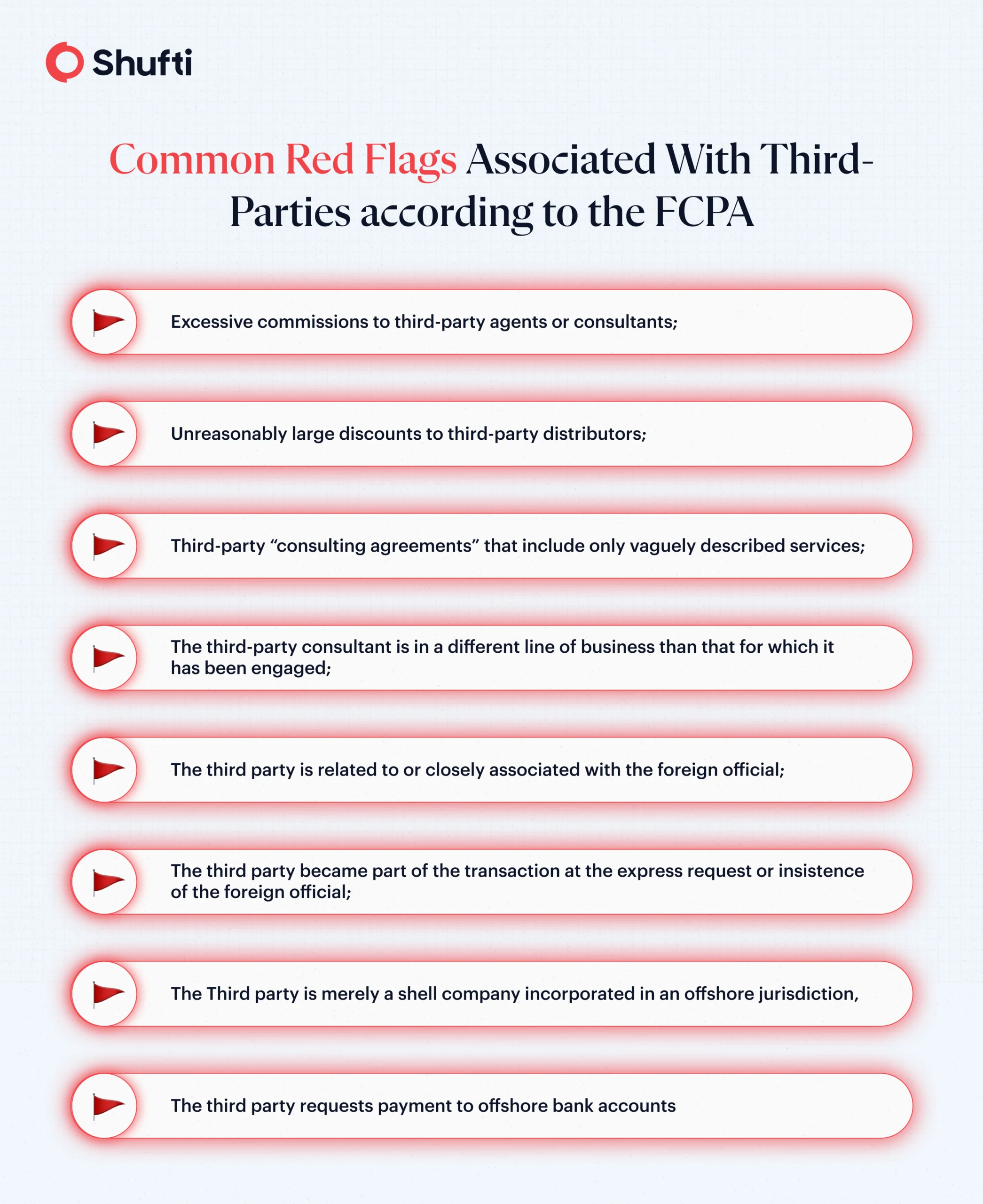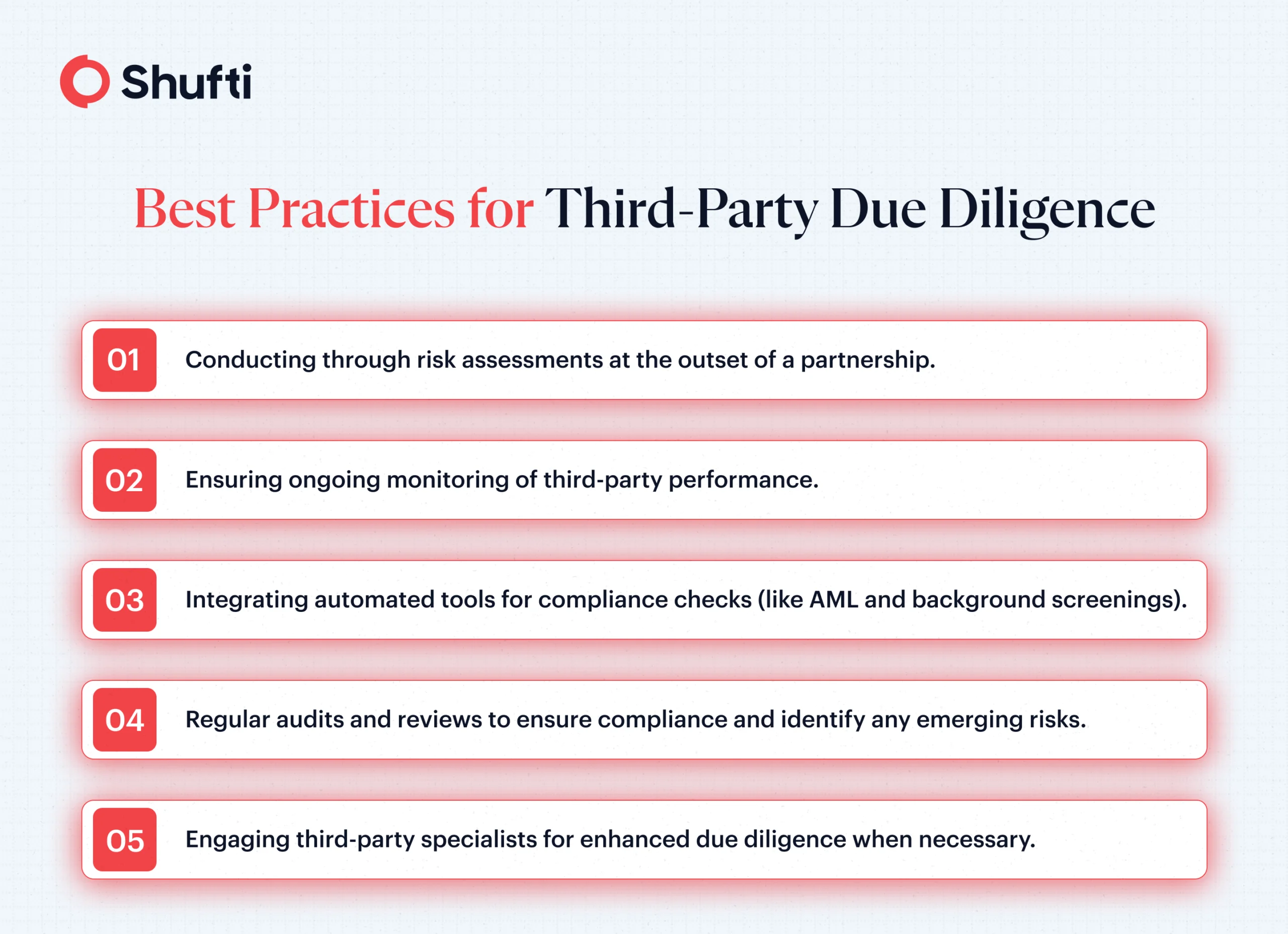Why Third-Party Due Diligence is Essential for Business Success

- 01 What is Third Party Due Diligence?
- 02 Why is Third-Party Due Diligence So Important?
- 03 Is there a Legal Requirement of Third-Party Due Diligence for Businesses?
- 04 Key Steps in Third-Party Due Diligence:
- 05 What are the Real-World Consequences of Poor Third-Party Due Diligence
- 06 How Shufti Helps with Third-Party Due Diligence:
Picture this: You run a business in the United States, and you want to expand into the European market. You would then have to find third-party distributors in Europe that help you get your products to European consumers (such as establishing new supply chains, marketing, product listing, advertising, etc). You find a third-party entity that has a great reputation, an established network, and values that align with your brand image. You’re all set.
However, without proper due diligence of the third party, you might unknowingly enter into a contract with a company that may be involved in unethical practices, facing financial instability, or not in compliance with AML/CFT regulations.
That is where third-party due diligence becomes critical. It ensures that the partners you onboard align with the legal and financial standards you uphold, thereby safeguarding your business interests from potential risks.
What is Third Party Due Diligence?
Simply put, third-party due diligence revolves around verifying the company you intend to do business with. It is a critical process that includes investigating and understanding your business partners so that you can evaluate the risks associated with third-party vendors, suppliers, partners and/or contractors. This process involves suitable inquiries into the business practices of the third-party entity to assess its regulatory compliance, operational capability, and financial stability to ensure that the company you are about to enter into business with aligns with your values.
The central aim of third-party due diligence is to instil confidence that vendors, contractors and other service providers are legitimate businesses with an established network, and not some corrupt entity engaged in unlawful business activities.
Did you know?
The U.S Foreign Corrupt Practices Act (FCPA) explicitly prohibits companies and their intermediaries from engaging in bribery and corrupt practices. The FCPA imposes penalties on U.S companies that do not conduct proper due diligence on third parties and are involved in corrupt practices.
A Resource Guide to the U.S Foreign Corrupt Practices Act, Second Edition
Why is Third-Party Due Diligence So Important?
Without thorough vetting, entering into a business relationship with third parties can expose organizations to multiple risks:
-
Financial Risks:
Third-party partners with unstable financial practices can jeopardize business operations. If the company you contracted with to advertise your business suddenly declares bankruptcy, for example, it will cause severe financial consequences to your business.
-
Reputational Risks:
Following the same line of thought, associations with unethical or non-compliant third parties can damage your organization’s reputation by virtue of association.
-
Compliance Risks:
Suppose the third-party fails to follow the guidelines of their respective regulator, whether international or national, and is subsequently listed on a Sanctions list. By virtue of association with the third party, the consequences can also be directed towards you.
-
Operational Risks:
Inefficient and poorly managed third-party businesses are likely to cause disruptions in providing their services, failing to meet their contractual obligations under the contract, and adversely affecting the growth of your business.

Is there a Legal Requirement of Third-Party Due Diligence for Businesses?
Third-party due diligence is not only a suggested improvement, it is a legal requirement. Several regulations across the globe require businesses to conduct risk assessments before onboarding a third-party company.
-
Digital Operational Resilience Act (DORA):
This EU regulation requires financial institutions to confirm that their third-party vendors (particularly those in IT services) are resilient against cyber attacks. The DORA Regulatory Technical Standard (RTS) on information and communication technology (ICT) requires financial institutions to adopt an “appropriate and proportionate” process for due diligence of the third-party ICT service before entering into a contract.
-
Corporate Sustainability Due Diligence Directive (CSDDD):
Adopted by the EU, the CSDDD Directive requires businesses to conduct third-party due diligence to identify and address any risks related to:
- Human Rights Violations.
- Environmental Harm.
- Unethical business practices.
While the enforcement of this EU Directive and the specific penalties in the case of non-compliance with the Directive is determined by the EU Member States, holding third-party vendors, suppliers, and contractors to the CSDDD ethical standard will help businesses avoid the civil and administrative penalties.
-
Foreign Corrupt Practices Act (FCPA):
A U.S. law prohibits companies and third parties from engaging in bribery and corrupt practices and advises proper due diligence to prevent such misconduct.
Key Steps in Third-Party Due Diligence:
Effective due diligence of third-party relationships involves multiple steps:
-
Risk Assessment:
The starting point in conducting due diligence of a third party for a business engagement is to conduct an in-depth risk assessment of the company. This includes evaluation risks associated with the third-party company:
- Geographic location – to assess the political and economic stability of the jurisdiction in which the third-party is based.
- Industry Reputation – Research and conclude whether the third party’s reputation in its industry is reliable or not.
- Financial health – Reviewing the financial statements and credit ratings of the company to understand its economic history.
- Compliance history – investigating the company’s previous compliance violations or legal issues, if any.
-
Gathering Information:
After the requisite risk assessment has been carried out, collect internal business information about the third-party entity, such as:
- Corporate Structure: Verify the ownership and organizational hierarchy of the company to ensure that you are dealing with the rightful owners of the company. Further, verification of the company’s business licenses and certifications is required to conclude whether the company meets the legal standards of the jurisdiction in which it operates.
- Operational Capability – Assess whether the company’s operational capability satisfies your business requirements and would be able to meet the contractual obligations.
-
Enhanced Due Diligence:
Depending upon the nature of business requirements, or if the third-party company is located in a high-risk jurisdiction, take additional measures for due diligence, such as:
-
- Site Visits: Inspect facilities and operations in person.
- Interviews: Conduct meetings with the management and staff to understand the company culture.
- Independent Audits: If need be, conduct independent audits to understand the company’s financial standing and compliance history
- AML/CFT Verifications: For AML/CFT compliance, vet the third-party company’s source of income and/or Ultimate Beneficial Owner verifications.
-
Ongoing Monitoring:
Effective due diligence is not static. Implement ongoing monitoring for the entire course of the business relationship with the third-party to:
- Track Performance: Conduct frequent assessments of third parties ’ performance with agreed-upon deliverables.
- Audit Compliance: In addition to any audit inquiries at the time of onboarding, ensure continuous adherence to contractual obligations and regulatory compliance.
- Update Risk Profile: Based on the information received during ongoing monitoring, adjust risk assessments.

What are the Real-World Consequences of Poor Third-Party Due Diligence
Inadequate third-party due diligence can have devastating consequences for the businesses and their associated third-party. An unfortunate example is the data breach that impacted Target Corporation in 2013.
Target Corporation, a large retail company in the US, faced a massive data breach when a third-party HVAC (heating, ventilation, and air conditioning) vendor was compromised. The breach affected over 40 million customers, exposing sensitive customer payment information. The third-party vendor had ineffective security measures, and Target did not conduct proper due diligence on the third-party HVAC company before entering into a contract.
The financial impact of this data breach was notable:
- $18.5 million settlement for affected customers.
- A settlement with the affected banks for approximately $58 million
- Reputation damage and plummeting consumer trust in the Target Corporation.
This breach demonstrates that failure to vet and monitor third-party vendors properly can have far-reaching financial and reputational consequences for businesses.
How Shufti Helps with Third-Party Due Diligence:
When it comes to third-party due diligence, ensuring compliance and mitigating risk is important. To make this process hassle-free, Shufti offers a complete solution for third-party due diligence, covering every aspect of risk assessment:
- Identity Verification: Establish the legitimacy of individuals involved in third-party relationships.
- Business Entity Verification: Make sure that the companies you engage with are legitimate and compliant.
- AML Screening: Screen third-parties against global sanction lists, PEP databases, and Watchlists.
- Warnings and Regulatory Enforcements Screening: Identify any legal actions, fines, or sanctions associated with third-party companies.
- Adverse Media Screening: Flag negative news about third-party businesses that could negatively impact your reputation or pose compliance risk by association.
Additionally, our industry-leading real-time IDV Solution allows you to authenticate third-party businesses. Coupled with Shufti’s Business verification measures, your business can gain an in-depth understanding of the internal and external risks associated with third-party partners.
Ready to protect your business from third-party risks?
Request a demo today and discover how Shufti can streamline your due diligence process and keep your business safe.

 Explore Now
Explore Now













